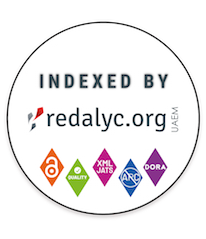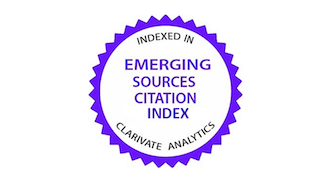Antibacterial activity of aqueous extract of propolis from Irapuato, Guanajuato, Mexico.
DOI:
https://doi.org/10.15517/am.v28i1.24253Keywords:
Apis mellifera, mexican propolis, antimicrobial activity.Abstract
The objective of this study was to evaluate the antibacterial activity of an aqueous extract of propolis. In February 2015, the propolis was collected in an apiary located in Irapuato, Guanajuato, Mexico. 300 g of propolis were fractionated and added to 500 ml of an ethanol solution 70%, in continuous stirring for fteen days. The liquid phase was separated by vacuum ltration, the ethanol of that phase was evaporated in a rotoevaporator driven at 90 revolutions per minute (rpm) and 80 °C. The final residue was resuspended in distilled water, thereby obtaining the aqueous extract. A propolis extract obtained with concentrated ethanol was used as a reference control, in addition, ethanol and water controls were included. The antibacterial activity of the extracts was evaluated by diffusion technique in agar, using strains of Escherichia coli (ATCC-10536), Salmonella typhimurium (ATCC-13311), Listeria monocytogenes (ATCC-19115) and Staphylococcus aureus (ATCC-11632) developed in Tryptic-Soy-Agar. After be incubated the bacteria at 37 °C for 24 hours (h), and the halo of inhibition was measured. Only in the ethanol extract used as a control, was observed antimicrobial activity against S. aureus and L. monocytogenes; for E. coli and S. typhimurium was not observed any effect. The aqueous extract had no effect on any of the four bacteria evaluated, concluding that the active ingredients of propolis are not soluble in water, so are lost in a process of aqueous extraction.
Downloads
References
Aliboni, A. 2014. Propolis from northern California and Oregon: chemical composition, botanical origin, and content of allergens. Z. Naturforsch C. Bio. Sci. 69:10-20.
Bankova, V., M. Popova, and B. Trusheva. 2014. Propolis volatile compounds: chemical diversity and biological activity: a review. Chem. Cent. J. 8:28. doi:10.1186/1752-153X-8-28
Bilgin, G., K. Kismet, S. Kuru, F. Kaya, M. Senes, Y. Bayrakceken, N. Yumusak, F.T. Celikkan, E. Erdemli, O.G. Celemli, K. Sorkun, and G. Koca. 2016. Ultrastructural investigation of the protective effects of propolis on bleomycin induced pulmonary brosis. Biotech. Histochem. 91:195-203.
Carrillo, M.L., L.N. Castillo, y R. Mauricio. 2011. Evaluación de la actividad antimicrobiana de extractos de propóleos de la Huasteca Potosina (México). Inf. Tecnol. 22:21-28.
Choi, Y.M., D.O. Noh, S.Y. Cho, H.J. Suh, K.M. Kim, and J.M. Kim. 2006. Antioxidant and antimicrobial activities of propolis from several regions of Korea. LWT Food Sci. Technol. 39:756-761.
Gavanji, S., B. Larki, A.J. Zand, E. Mohammadi, M. Mehrasa, and A.H. Taraghian. 2012. Comparative effects of propolis of honey bee on pathogenic bacteria. Afr. J. Pharm. Pharmacol. 6:2408-2412.
González, M.J., M.L. Juárez, H. Ramírez, C.I. Soto, L. Carrillo, and T.A. Cruz. 2015. Protective effect of a mexican propolis on MDBK cells exposed to Aujeszky’s disease virus (Pseudorabies virus). Afr. J. Tradit. Complement. Altern. Med. 12:106-111.
Heon, K.P., K. Sang, and S. Chang. 2008. Antimicrobial activity of water soluble propolis. Korean J. Food Nutr. 21:15-21.
Kim, Y.H., and H.J. Chung. 2011. The effects of Korean propolis against foodborne pathogens and transmission electron microscopic examination. New Biotechnol. 28:713-718.
Kim, K.T., E.J. Yeo, Y.S. Han, S.Y. Nah, and H.D. Paik. 2005. Antimicrobial, anti-in ammatory, and anti- oxidative effects of water and ethanol extracted Brazilian propolis. Food Sci. Biotechnol. 14:474-478.
Kuropatnicki, A.K., E. Szliszka, and W. Krol. 2013. Historical aspects of propolis research in modern times. J. Evid. Based Complement. Altern. Med. 2013:1-11.
Li, A., H. Xuan, A. Sun, R. Liu, and J. Cui. 2016. Preparative separation of polyphenols from water-soluble fraction of Chinese propolis using macroporous absorptive resin coupled with preparative high performance liquid chromatography. J. Chromatogr. B. Analyt. Technol. Biomed. Life Sci. 1012:42-49.
Londono, O.A., J.G. Ávila, M.M. Canales, C.T. Hernández, P.R. Serrano, C.M. Flores, A. Durán, J.G. Penieres, C.G. García, and T.A. Cruz. 2010. Antibacterial comparative study between extracts of Mexican propolis and of three plants which use Apis mellifera for its production. J. Anim. Vet. Adv. 9:1250-1254.
Mavri, A., H. Abramovic, T. Polak, J. Bertoncelj, P. Jamnik, S. Smole, and B. Jersek. 2012. Chemical properties and antioxidant and antimicrobial activities of Slovenian propolis. Chem. Biodivers. 9:1545-1558.
Nina, N., B. Lima, G.E. Feresin, A. Giménez, E. Salamanca, and G. Schmeda. 2016a. Antibacterial and leishmanicidal activity of Bolivian propolis. Lett. Appl. Microbiol. 62:290-296.
Nina, N., C. Quispe, F. Jiménez, C. Theoduloz, A. Giménez, and G. Schmeda. 2016b. Chemical pro ling and antioxidant activity of Bolivian propolis. J. Sci. Food Agr. 96:2142-2153.
Osés, S.M., A. Pascual, M.A. Fernández, T.M. López, and M.T. Sancho. 2016. Bioactive properties of honey with propolis. Food Chem. 196:1215-1223.
Rahman, M.M., A. Richardson, and M. So an. 2010. Antibacterial activity of propolis and honey against Staphylococcus aureus and Escherichia coli. Afr. J. Microbiol. Res. 4:1872-1878.
Serra, B.J., and A. Lacalle. 2012. The antimicrobial effects of propolis collected in different regions in the Basque Country (Northern Spain). World J. Microbiol. Biotechnol. 28:1351-1358.
Sotero, A.B., L. Rodrigues, R.K. Barroso, R.R. Batista, S. Abreu, R. Fernández, and B.C. Vasconcelos. 2015. Antifungal activity of propolis against Candida species isolated from cases of chronic periodontitis. Braz. Oral Res. 29:1-6.
Siripatrawan, U., W. Vitchayakitti, and R. Sanguandeekul. 2013. Antioxidant and antimicrobial properties of Thai propolis extracted using ethanol aqueous solution. Int. J. Food Sci. Tech. 48:22-27.
Yang, H., Z. Huang, Y. Chen, C. Zhang, M. Ye, and L. Wang. 2016. Evaluation of the contributions of polyphenols in Chinese propolis by on-line HPLC-ABTS method. Eur. Food Res. Technol. 242:537-546.
Yildirim, A., G.G. Duran, N. Duran, K. Jenedi, B.S. Bolgul, M. Miraloglu, and M. Muz. 2016. Antiviral activity of hatay propolis against replication of herpes simplex virus type 1 and type 2. Med. Sci. Monit. 22:422-430.
Additional Files
Published
How to Cite
Issue
Section
License
1. Proposed policy for open access journals
Authors who publish in this journal accept the following conditions:
a. Authors retain the copyright and assign to the journal the right to the first publication, with the work registered under the attribution, non-commercial and no-derivative license from Creative Commons, which allows third parties to use what has been published as long as they mention the authorship of the work and upon first publication in this journal, the work may not be used for commercial purposes and the publications may not be used to remix, transform or create another work.
b. Authors may enter into additional independent contractual arrangements for the non-exclusive distribution of the version of the article published in this journal (e.g., including it in an institutional repository or publishing it in a book) provided that they clearly indicate that the work was first published in this journal.
c. Authors are permitted and encouraged to publish their work on the Internet (e.g. on institutional or personal pages) before and during the review and publication process, as it may lead to productive exchanges and faster and wider dissemination of published work (see The Effect of Open Access).



























